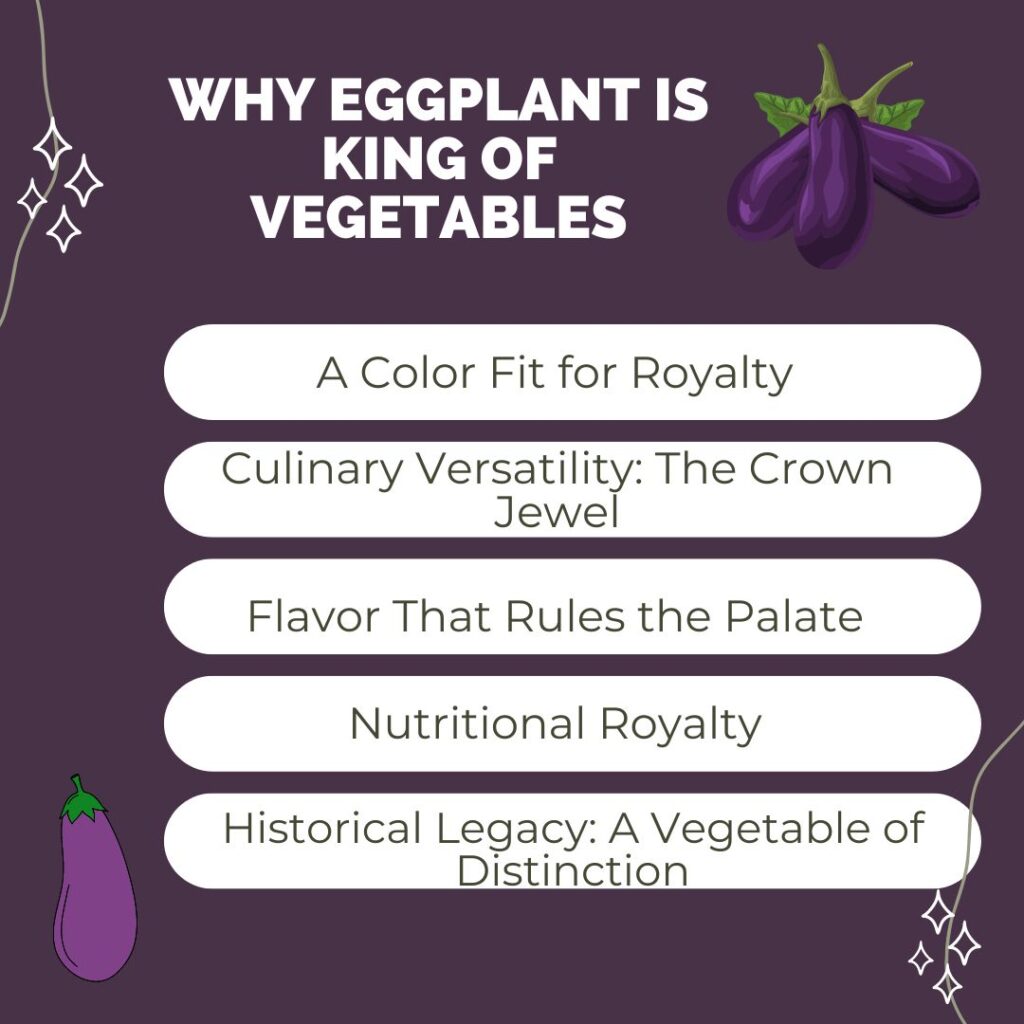The eggplant is considered the king of vegetables due to its regal appearance, versatile culinary applications, delightful flavor, and numerous health benefits. Its rich history and the ability to adapt to various cooking techniques further solidify its reign in the realm of vegetables.
Welcome to the extraordinary world of eggplants! Have you ever wondered why this vibrant purple vegetable holds the crown of royalty among its vegetable companions?
From its regal appearance to its exquisite taste and diverse culinary applications, the eggplant has rightfully earned the title of the king of vegetables.
In this article, we will embark on a captivating journey to explore the reasons behind the “Why eggplant is the king of vegetables”, unveiling its fascinating history, health benefits, and undeniable reign in gastronomy.
Why Eggplant Is King of Vegetables: A Brief Overview

When it comes to vegetables, the eggplant reigns supreme. But what exactly makes it so special? Let’s delve into the captivating reasons behind the eggplant’s undisputed kingship.
A Color Fit for Royalty
Eggplants flaunt a captivating shade of royal purple, setting them apart from their green and yellow counterparts. This regal hue symbolizes elegance, nobility, and richness, making the eggplant a feast for the eyes and the taste buds.
Culinary Versatility: The Crown Jewel
Eggplants possess incredible versatility in the culinary realm. Whether roasted, grilled, baked, or stewed, this majestic vegetable effortlessly adapts to a myriad of cooking techniques, making it a true crown jewel among ingredients.
Flavor That Rules the Palate
Bite into the eggplant, and you’ll be greeted by a delightfully creamy and slightly bitter flavor. Its meaty texture and ability to absorb other flavors like a sponge allowing it to take center stage in numerous delectable dishes, further solidifying its claim to the vegetable throne.
Nutritional Royalty
Beyond its regal appearance and delectable taste, eggplants offer a host of nutritional benefits. They are low in calories, rich in fiber, and packed with essential vitamins and minerals, making them a nutritious addition to any diet.
Historical Legacy: A Vegetable of Distinction
The eggplant boasts a fascinating historical legacy that stretches back thousands of years. Originating in ancient India and China, this esteemed vegetable made its way across continents, captivating the palates of cultures worldwide. Its journey is intertwined with tales of exploration, trade, and a relentless pursuit of culinary excellence.
Related Reading:
- Is Eggplant a Fruit or a Vegetable?
- What’s the Best Way to Cook Eggplant?
- White Shades Of Eggplant: Exploring the Versatility of White Eggplant
- Growing Brinjal at Home: A Complete Guide
The Health Benefits of Eggplant

Eggplant is packed with essential nutrients and compounds that contribute to its numerous health benefits. Let’s take a closer look at what makes this vegetable such a king of vegetables and a nutritional powerhouse.
- Rich in Nutrients: Eggplant is an excellent source of vitamins, minerals, and antioxidants. It is particularly high in fiber, potassium, manganese, and vitamin K. Additionally, eggplant contains small amounts of other essential vitamins and minerals, including vitamin C, vitamin B6, folate, and copper.
- Powerful Antioxidant Properties: One of the standout features of eggplant is its potent antioxidant properties. Antioxidants play a crucial role in protecting your body against harmful free radicals, which can contribute to various chronic diseases and accelerate aging.
- Potential Weight Loss Effects: If you’re on a weight loss journey, incorporating eggplant into your diet can be a smart move. With its low-calorie and high-fiber content, eggplant can help you feel full and satisfied while consuming fewer calories.
- Heart Health Benefits: Taking care of your heart is vital, and eggplant can be a valuable addition to your heart-healthy diet. The fiber, potassium, and antioxidants in eggplant work together to promote cardiovascular health.
- Blood Sugar Regulation: For individuals managing diabetes or aiming to prevent it, eggplant can be a beneficial dietary choice. The soluble fiber found in eggplant helps regulate blood sugar levels by slowing down the absorption of sugar in the bloodstream. This can contribute to improved insulin sensitivity and better overall blood sugar control.
- Digestive Health Support: A healthy digestive system is essential for overall well-being, and eggplant can play a role in supporting digestive health. The high fiber content in eggplant promotes regular bowel movements and prevents constipation.
From potential weight loss effects to heart health benefits, you’ll be amazed at what this vegetable has to offer!
Related Reading:
- Why Cats Are Afraid of Cucumbers? The Surprising Truth Revealed!
- Can You Eat Deformed Zucchini?
- Do deer eat tomato plants?
- How to Grow Pumpkins in Pots?
Conclusion: Long Live the Vegetables King – Eggplant!
With its captivating color, versatility in the kitchen, delectable flavor, and remarkable health benefits, the eggplant has rightfully claimed its throne as the king of vegetables. From ancient civilizations to modern-day kitchens, its reign has remained unrivaled.
So, the next time you encounter this majestic vegetable, remember to embrace its regal nature and let it elevate your culinary creations to new heights.




